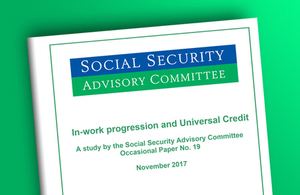In-work progression and Universal Credit: SSAC report published
The Social Security Advisory Committee (SSAC) calls for a better understanding of how low-paid workers can progress to better-paid jobs or extra hours.

The Social Security Advisory Committee (SSAC) report published today (9 November 2017) presents the findings of its research which involved speaking with work coaches, policy experts, employers and a small number of working recipients of Universal Credit.
The Department for Work and Pensions (DWP) has embarked on an ambitious programme of in-work support through Universal Credit which is without precedent internationally. This extends conditions and support to people in low paid work only applying to unemployed claimants previously, with the goal of increased earnings and reduced benefit payments. The current ‘test and learn’ approach takes the form of a randomised control trial (RCT) testing the impact of different frequencies of work coach intervention.
The committee believes that DWP is right to be cautious given the very large number of households in scope. Of the 590,000 people receiving Universal Credit, 39% (230,000) are working. While it is not known how many people in work will get Universal Credit when it replaces tax credits, in 2015-16, 3 million families received in-work tax credit payments totalling £20.5 billion. While it is too soon to draw firm conclusions on how the current in-work approach is faring, SSAC concludes that DWP should:
- Test a much broader range of interventions, including those identified by work coaches in local jobcentres, taking account of personal and local circumstances.
- Establish a clear evaluation framework to enable local testing, while drawing on the central analytical capacity to ensure rigorous evaluation.
- Avoid constraining work coaches with tightly-prescribed targets. However, policy and guidance needs to clarify the variety of reasons people have for working part time (for example, having young children, having a disability or long-term condition, early phase self-employment, studying or re-training) if work coaches are to use discretion appropriately.
- Develop a richer understanding of working claimants and employers in key sectors. It is particularly important for DWP to understand routes into low paid work and the diverse circumstances of low paid households before any large scale migration of tax credit recipients onto Universal Credit.
- Take a data-driven approach to segmenting people’s circumstances, drawing on skills, work experience and attitudinal data.
- Fix the delays and complexity reported by Universal Credit claimants which may hinder in-work progression. The rules for couples are particularly complicated. Universal Credit needs to provide predictable support if it is to really help people increase their earnings. A better ‘it pays to progress’ calculator is needed for both recipients and work coaches to have greater confidence.
Paul Gray, Committee Chairman said:
As tax credits migrate into Universal Credit, DWP is making a major shift from its traditional role of helping the unemployed into work towards supporting those already in low paid work to increase their earnings. This is a major challenge no other country has attempted on this scale. Our report highlights ways in which this focus on in-work support can best be tailored and improved.
Chris Goulden, Chair of the committee’s Independent Work Programme sub-committee said:
The department is currently examining the effectiveness of different techniques of work coach contact, but this trial is quite narrowly focused. Our research highlights the breadth and complexity of in-work progression, as well as the wide range of affected groups – which includes both employers and working claimants. The committee would encourage the department to set out its broader aims on in-work progression as well as take up our recommendation to enable a broader and more innovative set of practices to be tested.
Read the SSAC report – In-work progression and Universal Credit
Contact the committee
Social Security Advisory Committee
7th Floor Caxton House
Tothill Street
London
SW1H 9NA
Email ssac@ssac.gov.uk
Denise Whitehead, Committee Secretary 0300 046 0323
We are not able to reply to enquiries about individual benefit cases. You will need to contact the Department for Work and Pensions.